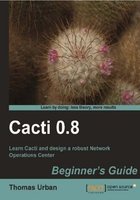
We now have a working Cacti installation which also has some nice graphs to show, so let's now add some users to our Cacti installation.
In this chapter we are going to:
- Add new users
- Set up Realms and Graph permissions for a user
- Create a template user
- Integrate LDAP/Active Directory authentication
- Manage users with the Cacti CLI
So let's get started….
Cacti integrates a granular user management approach, which lets administrators define access and permissions to trees, hosts, or single graphs. This section will provide you with some detailed information about user management.
Generally speaking, users within Cacti can be divided into three different groups:
The difference between these users is the way they authenticate against the system and the access rights that they have. There exist no special groups for these different types of users.
Guest accounts would be used for a public Cacti server, offering the viewing of graphs to any interested person. This can be an internal server or one which monitors your own home network.
Normal user accounts need to authenticate against the server and can then access different parts of the system. Normal users can be restricted to view just a single Cacti tree, therefore making them the first choice for sharing a Cacti installation between different customers (for example, within a hosting environment).
Administrator accounts can administer Cacti by using the Cacti console. They cannot be restricted to, for example, administer just a small group of users, but different tasks within Cacti can be allowed or denied to an administrator. These include permissions to access global settings as well as to update hosts or graph templates.
The concept of groups does not exist within Cacti, but to compensate for this, Cacti does offer the ability to copy "template users". Template users are normal users where all permissions and access rights have already been set up. Based on this concept you are going to learn about the Batch Copy function.
As mentioned earlier, permissions in Cacti can be set as granular so that you can give access to one specific graph only. Permissions within Cacti are divided into Realm Permissions and Graph Permissions. Realm Permissions define the access rights of the Console, whereas the Graph Permissions define the access to the tree and graphs.